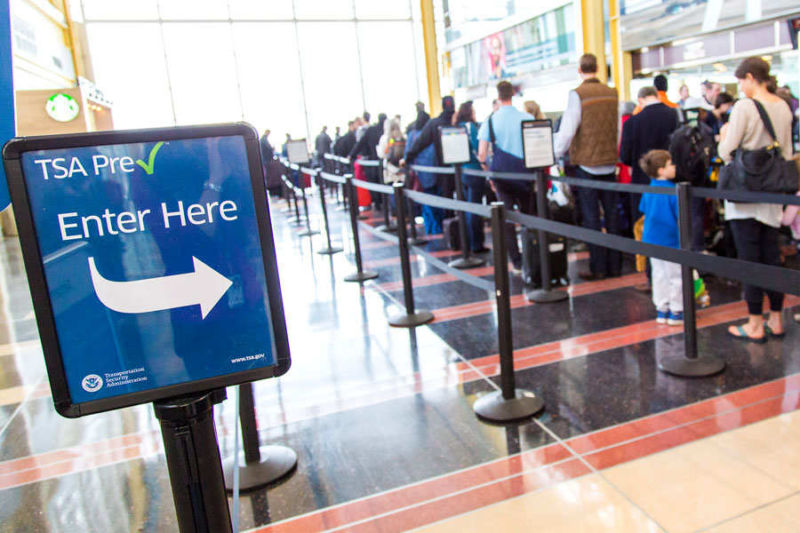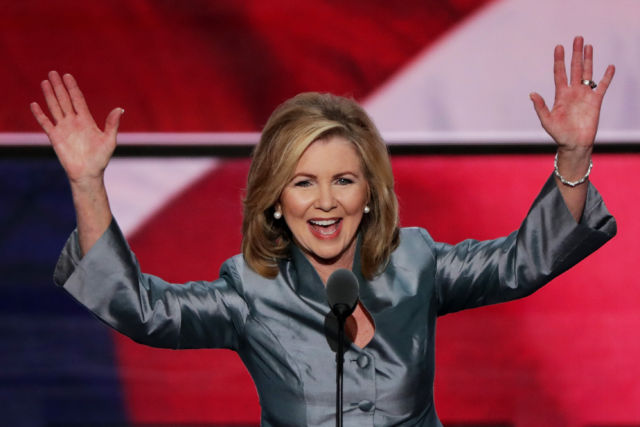
Congressional Republicans want to impose "net neutrality" rules that allow Internet service providers to charge online services and websites for priority access to consumers. Making the case for paid prioritization Tuesday, US Rep. Marsha Blackburn (R-Tenn.) said that paying for priority access would be similar to enrolling in TSA Precheck.
"In real life, all sorts of interactions are prioritized every day," Blackburn said in her opening statement at a subcommittee hearing on paid prioritization. Blackburn continued:
Many of you sitting in this room right now paid a line-sitter to get priority access to this hearing. In fact, it is commonplace for the government itself to offer priority access to services. If you have ever used Priority Mail, you know this to be the case. And what about TSA Precheck? It just might have saved you time as you traveled here today. If you define paid prioritization as simply the act of paying to get your own content in front of the consumer faster, prioritized ads or sponsored content are the basis of many business models online, as many of our members pointed out at the Facebook hearing last week.
Dividing up online services into those that have paid for TSA Precheck-like priority access and those that haven't wouldn't necessarily be appealing to consumers. While TSA Precheck lets travelers zoom through security, everyone else is stuck in a long, slow-moving line and met with frequent obstacles. Comparing paid prioritization to TSA Precheck lends credence to the pro-net neutrality argument that allowing paid fast lanes would necessarily push all other online services into "slow lanes."

In Blackburn's analogy, the buyers of TSA Precheck are online services and websites rather than home or mobile Internet users. Online services that don't acquire Blackburn's version of TSA Precheck for the Internet would be relegated to the standard airport security line that everyone knows and hates. (Precheck lets travelers go through airport security more quickly; it costs $85 for five years and requires a background check and fingerprinting.)
Blackburn could write nation’s net neutrality laws
Internet users can already pay for faster access by upgrading to a higher Mbps tier, but that makes a user's entire Internet connection faster without giving priority to one service or another. ISPs could implement paid prioritization in a way that requires users to pay extra for certain online services to load faster and operate more smoothly. If we apply Blackburn's TSA Precheck analogy to such a scenario, the other online services users access would frequently stutter and stop, just like an airport security line.
Maybe we shouldn't treat Blackburn's TSA Precheck analogy so seriously—but this is the actual pro-paid prioritization argument being used by a key Republican who could end up writing the nation's net neutrality laws. Blackburn is chair of the House Communications and Technology subcommittee—though she is running for Senate and polling well behind her Democratic opponent despite running in a Republican-heavy state.
The Blackburn-authored "Open Internet Preservation Act" would outlaw blocking and throttling but allow paid prioritization. By contrast, the Federal Communications Commission's net neutrality rules, which are coming off the books, did not allow blocking, throttling, or paid prioritization.
Blackburn's legislation would also prohibit state governments from enacting their own net neutrality laws and prohibit the FCC from imposing any type of common carrier regulations on broadband providers.
Blackburn said in Tuesday's hearing that she wants "to leave aside the simplistic 'fast lane' talking points and kick off a more realistic discussion on the subject. My net neutrality bill left out the old language banning all paid prioritization because I believe that we need a more nuanced approach and a more thorough and thoughtful discussion."
Blackburn: Health care services could pay for priority
Blackburn argued that paid prioritization is needed for 911 calls, telemedicine, services for disabled people, and autonomous vehicles. This argument has been made repeatedly—one Republican senator argued last year that net neutrality rules give pornography and "illegal content" the same level of network access as remote medical services.
In reality, the FCC's ban was on paid prioritization, not prioritization of any type. Even the FCC's paid prioritization ban had an exception that let ISPs carve out isolated network capacity for certain applications. Telemedicine, automobile telematics, and school-related applications and content were among the services that could be given isolated capacity, the 2015 net neutrality order said.
The FCC treated isolated applications as "non-broadband" services, and the net neutrality rules did not apply to them.
ISPs were also allowed to block and throttle Internet content in cases of "reasonable network management," defined as a practice "that has a primarily technical network management justification," is used to "achieve[e] a legitimate network management purpose," and is not influenced by other "business practices." The rules also allow ISPs to block illegal Internet content.
Priority would depend on “an ISP’s bottom line”
Even the Republican committee staff said in a hearing background memo that standard network protocols used by ISPs give higher priority to video and virtual reality applications than text. The FCC's net neutrality rules didn't prevent that.
By contrast, net neutrality rules that allow any form of paid prioritization would let any type of online service—whether it be porn or telemedicine—pay for priority. If ISPs charge for priority, then health care businesses that don't pay the asking price would be prioritized behind services that do pay ISPs.
If the FCC net neutrality rules aren't restored, "prioritization practices that once were required to meet the standard of 'reasonable network management,' as judged by federal experts in network engineering, telecommunications, and competition policy at the FCC, will now be determined by an ISP's bottom line," Rep. Michael Doyle (D-Penn.) said at the hearing.
US Rep. Greg Walden (R-Ore.), chair of the House Energy and Commerce Committee, supported a ban on paid prioritization in 2015. At Tuesday's hearing, he said that lawmakers should not "waste our efforts on partisan legislation," referring to a Democratic bill that would restore the FCC's full net neutrality rules.
"Prioritization has nothing to do with traffic speed, rather it is putting certain bits over others to ensure that all packets arrive to their destination on time," Walden said. "A complete ban on prioritization would not permit this and would not allow some services and applications to operate smoothly."
Walden noted that big online services already pay for prioritization in the form of network interconnection agreements with ISPs and services offered by content delivery networks (CDNs).
Interconnection and CDNs are distinct from paid prioritization as it's defined in net neutrality rules. While interconnection and CDNs ensure a smooth delivery of traffic to the edge of consumer broadband networks, paid prioritization would affect which services are given priority over the wires leading directly into consumers' homes or over the cellular connections to smartphones.
“This makes no sense, and no one is buying it”
Republicans also pointed out in their hearing memo that websites implement their own forms of prioritization. "Search engines, for example, optimize result pages to put some websites higher on the list than others," the memo said. "Some sites pay to have their website prioritized in a search query, whereas other affiliate companies can have their pages prioritized through the parent companies' search engine free of charge."
Democrats were not convinced that net neutrality legislation should allow all forms of paid prioritization.
"Where there was once agreement on a prohibition on fast lanes, some now want to add loopholes to net neutrality," Energy and Commerce Ranking Member Frank Pallone Jr. (D-N.J.) said at the hearing. "The reasoning is convoluted and confusing—they argue that somehow allowing broadband providers to charge small companies extra for Internet fast lanes is good for small business. This makes no sense, and no one is buying it. Small businesses oppose having to pay extra for fast lanes. So do telemedicine companies, disabled veterans groups, self-driving car companies, churches, non-profits, and the list goes on."
reader comments
282